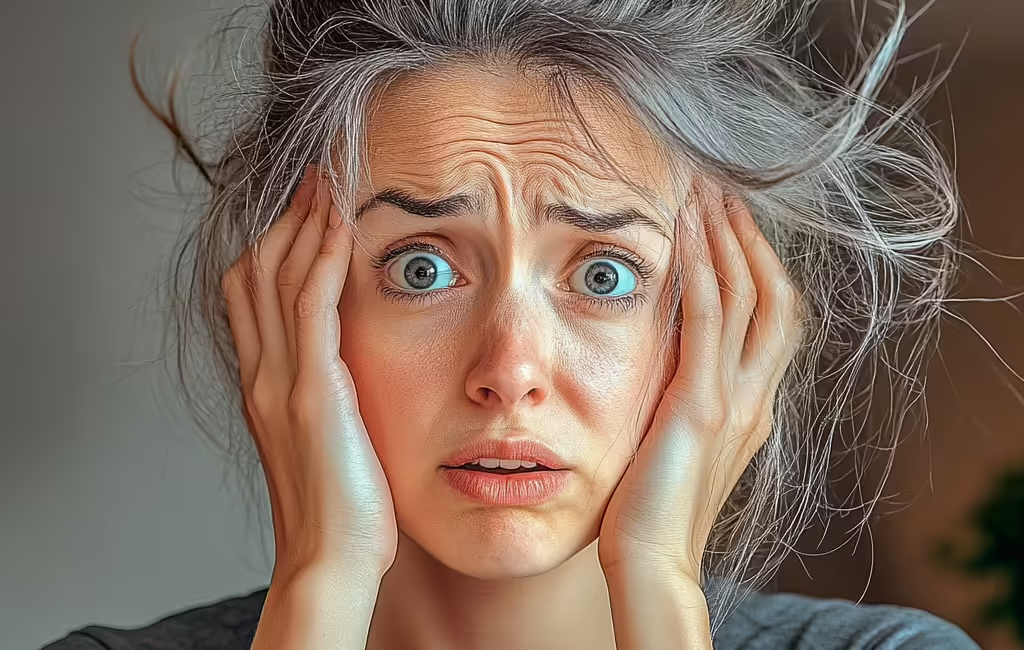- Menopause Unfiltered – The Stages, Symptoms, and What to Expect
- Stop Suffering in Silence: Essential Solutions for Menopause Vaginal Dryness and Atrophy
- Menopause and the Mental Shift: Navigating Brain Fog, Anxiety, and the Emotional Rollercoaster
- Foods, Herbs, and Teas to Support Menopause Naturally: A Guide to Easing Symptoms with Nature’s Remedies
When we hear about menopause, we often think about hot flashes and mood swings. But there’s another layer to this experience that often gets overlooked—the mental shifts that menopause brings. Brain fog, sudden anxiety, and emotional swings can leave us feeling as if our minds are out of control. And for many of us, this is even more disorienting than any physical symptoms.
Menopause can make us feel like strangers in our own minds, but it doesn’t have to be this way. Let’s dive into what’s really going on inside the brain during menopause, explore why it happens, and find ways to bring clarity, calm, and balance back into our lives.
The Root of the Mental Shifts: What’s Really Happening
To understand why menopause causes these mental changes, it’s essential to know how hormones like estrogen and neurotransmitters work together to maintain brain health and mood stability.
What is Brain Fog?
“Brain fog” is a term many of us use to describe feelings of mental cloudiness or confusion. It often manifests as:
- Difficulty Concentrating: Struggling to focus on tasks or conversations.
- Forgetfulness: Losing track of thoughts, misplacing items, or forgetting details.
- Mental Fatigue: Feeling mentally drained after simple activities.
Brain fog occurs when the brain’s usual chemical balance is disrupted. During menopause, fluctuating levels of estrogen impact neurotransmitters like serotonin and dopamine, which are responsible for regulating mood, energy, and clarity.
Research: A study in Menopause found that up to 60% of women experience brain fog and cognitive changes during menopause, with symptoms often peaking during perimenopause (the years leading up to menopause)【source】.
Estrogen and Mental Clarity
Estrogen isn’t only for reproduction; it also plays a big role in brain function. This hormone helps regulate blood flow to the brain, promoting cognitive functions like memory and mental clarity. When estrogen drops, the brain loses this natural support, leading to symptoms like brain fog and concentration issues.
Serotonin, Mood, and Anxiety
Estrogen directly influences serotonin, the “feel-good” neurotransmitter responsible for mood stability and emotional balance. When estrogen levels fall, serotonin drops as well, leaving us more vulnerable to anxiety and sudden emotional shifts. These hormonal changes are why menopausal women are at a higher risk for anxiety and depressive symptoms.
Research: Studies published in the American Journal of Psychiatry indicate that women going through menopause are twice as likely to experience anxiety and depressive symptoms compared to premenopausal women【source】.

The Historical Context: From “Hysteria” to Clarity
In the past, when women exhibited symptoms like anxiety, brain fog, or mood swings, they were often labeled as suffering from “hysteria.” Derived from the Greek word hystera (meaning uterus), hysteria was a catch-all diagnosis for any unexplained mental or emotional symptom in women. Because menopause was poorly understood, physicians frequently attributed these symptoms to “hysteria” and even recommended hysterectomies to “cure” women.
Thankfully, today we know better. Menopause-related mental shifts are natural and stem from hormonal changes, not from any inherent instability. Knowing the history helps remind us of how far we’ve come—and why it’s so important to understand and address these symptoms openly.
Empowering Strategies to Manage Menopause-Related Mental Shifts
Understanding the “why” behind these changes is the first step. Now, let’s explore evidence-backed strategies that can make a real difference in mental clarity, mood stability, and overall well-being.
1. Float Therapy: A Reset for Mind and Body
Float therapy, also known as sensory deprivation therapy, involves lying in a tank of saltwater, allowing the body to float effortlessly. This experience of weightlessness reduces sensory input, giving the mind and body a deep rest.
How It Works
- Reduces Stress Hormones: Sensory deprivation helps reduce cortisol (the stress hormone), which often spikes during menopause due to emotional and physical stress.
- Boosts Mood-Regulating Chemicals: Floating stimulates the release of dopamine and endorphins, which naturally improve mood and mental clarity.
- Enhances Physical Relaxation: Floating reduces joint pressure and relaxes the muscles, providing physical and mental calm.
Study: Research in the Journal of Alternative and Complementary Medicine showed that over 80% of participants experienced reduced stress and anxiety after float therapy, with benefits lasting for days after each session【source】.
How to Try Float Therapy
If you’re new to floating, start with a 60-minute session. Many float centers offer introductory packages, and they’ll provide everything you need, including earplugs and guidance on what to expect.
2. Contrast Therapy: Energize and Reset with Hot and Cold
Contrast therapy, or alternating between hot and cold exposure, boosts circulation, reduces stress, and improves mental clarity by increasing blood flow and oxygen to the brain.
How It Works
- Enhances Blood Flow: Switching between hot and cold temperatures increases circulation, helping to deliver more oxygen to brain cells, which improves clarity and reduces brain fog.
- Releases Endorphins: The cold shock followed by warmth prompts the release of endorphins, boosting mood and reducing feelings of anxiety.
- Reduces Inflammation: By alternating between temperatures, contrast therapy reduces inflammation, relieving physical tension that can worsen mental stress.
Research: Studies published in the Journal of Strength and Conditioning Research found that contrast therapy improves mental resilience and mood, with participants reporting increased alertness and mental clarity【source】.
How to Try Contrast Therapy
- Contrast Showers: Alternate between warm water for 2–3 minutes and cold water for 30 seconds. Repeat this a few times, ending with cold to feel invigorated.
- Hot-Cold Packs: Use hot and cold packs on tense areas like the neck and shoulders to release physical and mental stress.
3. Creative and Mindful Activities
Activities like adult coloring books, journaling, and puzzles offer calm, grounding moments that improve focus and mental clarity.
Why They Help
- Mindfulness: Activities like coloring or completing a puzzle allow us to focus on one thing, which calms the mind and reduces overwhelm.
- Cognitive Exercise: Puzzles and memory games keep the mind active and help combat brain fog by stimulating neural connections.
- Emotional Release: Journaling can provide a mental “dumping ground” for worries, helping to release emotional tension.
Fact: Research in The Gerontologist shows that engaging in creative activities can enhance cognitive health, and it’s particularly effective in reducing stress and boosting happiness levels【source】.
How to Incorporate These Practices
- Adult Coloring: Spend 10-15 minutes coloring in the morning or before bed as a calming ritual.
- Journaling: Write a few lines each day, whether it’s thoughts, worries, or moments of gratitude.
- Puzzles: Dedicate a few minutes a day to a brain-boosting puzzle, like a crossword or Sudoku.
4. Herbal and Nutritional Support
Certain herbs and nutrients can be powerful allies in supporting brain health and mood stability during menopause.
Adaptogens for Stress Reduction
- Holy Basil: Known as “tulsi” in Ayurvedic medicine, this herb helps regulate cortisol and supports mental clarity. Try it as tea or in capsule form.
- Ashwagandha: This adaptogen reduces cortisol and stabilizes mood, making it a helpful option for menopausal anxiety.
Brain-Boosting Nutrients
- Omega-3 Fatty Acids: Found in salmon, walnuts, and flaxseeds, omega-3s are crucial for brain health and have been shown to improve cognitive function.
- Antioxidant-Rich Fruits and Vegetables: Foods like berries, spinach, and bell peppers protect brain cells from oxidative stress, promoting mental clarity.
Research: A study in Psychiatry Research found that omega-3 supplementation significantly improved mood and reduced anxiety symptoms in menopausal women【source】.
5. Physical Movement for Mood and Mental Clarity
Exercise doesn’t have to be intense to help manage menopause’s mental effects. Simple movement can help stabilize mood, improve clarity, and provide an energy boost.
Effective Exercises
- Tai Chi and Qigong: These practices combine gentle movement with mindfulness, helping to reduce anxiety and improve focus.
- Yoga Poses: Simple poses like Mountain Pose and Child’s Pose calm the nervous system and promote mental balance.
Research: A study in Psychosomatic Medicine showed that yoga reduces cortisol levels, boosts mood, and improves concentration, particularly in menopausal women【source】.
Moving Forward: Embracing Menopause’s Mental Shifts with Grace
Menopause is challenging, especially when it affects the mind. But by understanding what’s happening and incorporating these practical tools, we can navigate the journey with more ease, clarity, and self-compassion. These mental shifts are natural, and they’re a reminder of the body’s incredible adaptability.
As we embrace this stage with knowledge, compassion, and an openness to new solutions, we’re redefining what it means to move through menopause. This isn’t a season of loss—it’s a time of transformation and strength. We’re learning to navigate each wave, not as something to fight against, but as a part of ourselves we’re learning to understand and love.



